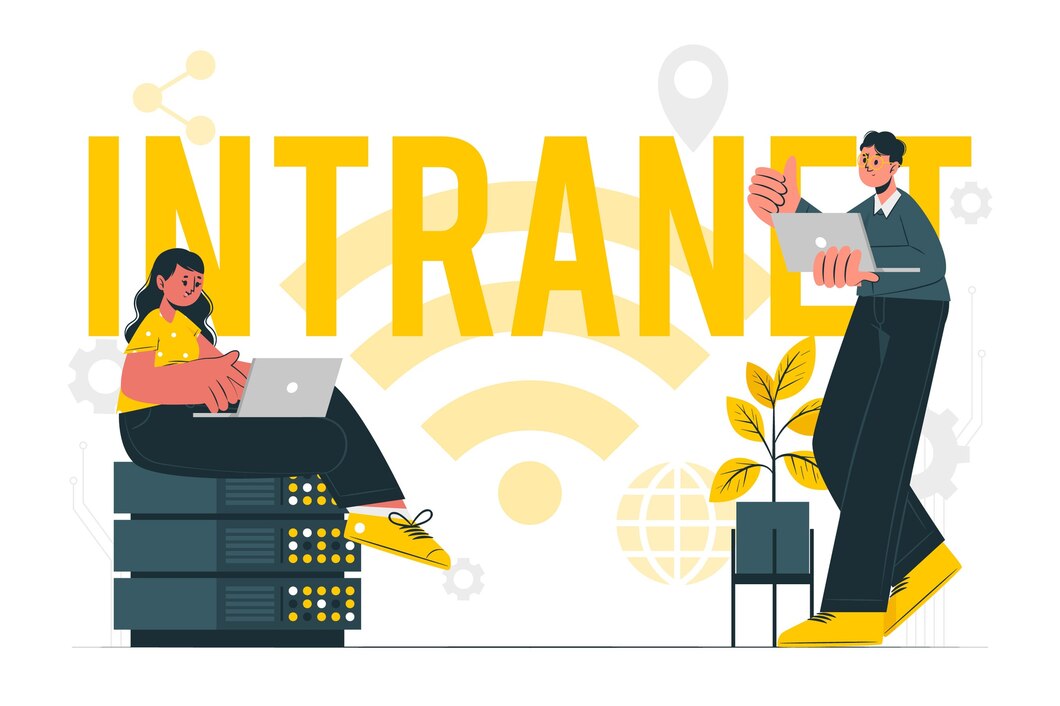Everything Employers Need To Know About Employee Intranet Software
4 Mins Read
Published on: 28 February 2024
Last Updated on: 08 May 2024

toc impalement
Trying to share company documents and communications with all employees effectively can be difficult, especially when that information should be kept private.
So, how can a business ensure its employees have access to important information without it being shared widely on the web?
A company intranet keeps your organization’s documents, training, and other sensitive materials off the internet and safe in a company-run system. These software programs can provide plenty of benefits and features, so they’re worth exploring as an option for organizing information.
Keep reading to learn everything necessary about employee intranet software.
What Is An Intranet?

Intranets are similar to the internet, except they are on a private network within an organization and not open to the public. Accessible only to authorized users within the company, this software facilitates internal communication, collaboration, file storage, and information sharing among employees.
Companies will also use these software programs to host company directories, news updates, and social networking capabilities. They serve as a centralized platform for employees and leaders to stay informed about the organization.
Pros And Cons Of Using Intranet Software
The pros of using an intranet software program are long-lasting and beneficial to any business. However, whenever taking on a project of this magnitude, it’s wise to understand the scoop and any ‘cons’ that come with it.
Pros:
- Improved Communication: Intranet software makes it easy for team members to stay informed about company news, policies, and events. It also provides instant messaging between employees, leaders, and departments, promoting collaboration and teamwork.
- Security: Since these software programs run on a private network, only authorized users can access stored information. Along with encryption and user verification, Intranet software has robust security features to protect sensitive company data.
- Project Management: Intranets often include tools for project management, such as project and task tracking and team calendars. These tools enhance productivity and efficiency.
- Cost-Effective: Once an intranet system has been implemented, maintenance costs are normally lower than those associated with other communication and collaboration solutions.
Cons:
- Implementation and Maintenance: To effectively deploy an intranet, a company must carefully plan this complex and often time-consuming project. Set up can require additional resources and technical expertise.
- Challenges with Integration: The more systems and programs a company uses, the more challenging it becomes to integrate intranet software. Time must be spent figuring out how each program can be implemented into the new system.
- User Adoption: Employees may resist using new software they are not used to, preferring to stay with familiar tools. Careful consideration of implementation strategies is required to ensure user adoption.
- Scalability: As an organization grows, its intranet may need to scale to accommodate more users and data. There may be some programs that cannot handle higher volume numbers effectively, so consider company goals in growth when choosing intranet software.
Related: 6 Tips To Keep Remote Employees Engaged
Features Of Intranet Software

Intranet software organizes and streamlines a business’ internal communication, collaboration, and knowledge management. It acts as a central digital hub for employees and leaders to access company information, resources, and tools. Key features of intranet software include:
1) Security of Company Information
Security is paramount when sharing important, sensitive company information with employees. Intranet software programs have user authentication and data encryption to protect this information.
2) Easy To User Interface
Intranets should have easy navigation and robust search capabilities, allowing employees to find the information they need quickly.
3) Helpful and Informative Company Tool
Internal FAQs, company org charts, and contact directories are helpful tools on an organization’s intranet.
4) Successful Collaboration Tool
Company templates, project files, and notes can all be housed in a central location on intranet software. This system facilitates team collaboration and prevents duplication of effort.
5) Different Access Levels
An organization may require different levels of access to different job roles, departments, levels of seniority, and contractors, and a well-configured intranet will support this multi-layered access.
6) Integration with Other Programs
A proficient intranet system will integrate with a business’ other programs and applications, becoming a seamless part of an employee’s work environment.
7) Supporting Employee Learning
Intranet software will have a place to set up employee learning, such as onboarding and ongoing training.
8) Company Community Forum
Allowing forums and commenting fosters internal communication and idea sharing among team members. It can also give insight if employees are unhappy.
9) Built-In Communication Tools
Direct communication features like messaging and video conferencing make collaborating with a team fast and convenient.
Conclusion: Understanding The Importance Of Intranet Software
In sum, adopting intranet software is much more than a technological investment; it is a strategic decision that can enhance the cohesiveness and efficiency of a business. With its comprehensive features, from secured data management to streamlined collaboration and communication tools, an intranet becomes the backbone of a thriving corporate culture.
Companies looking to foster a productive, engaged, and secure workplace environment should consider the multifaceted benefits of a robust intranet system.
Read Also:


















Comments Are Closed For This Article